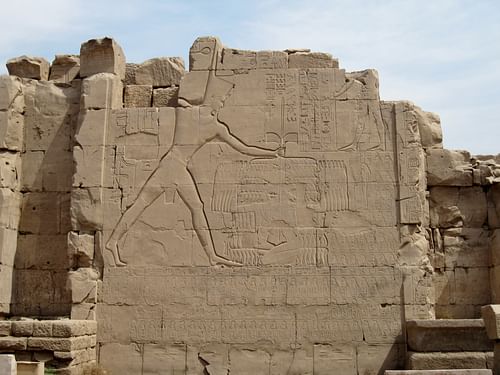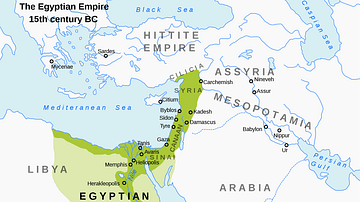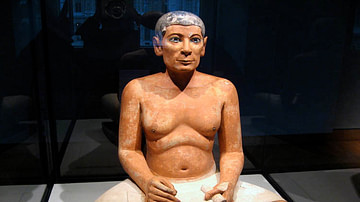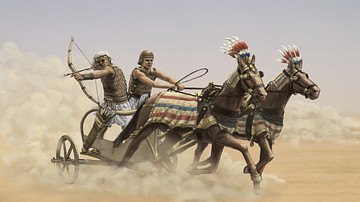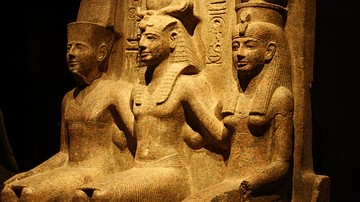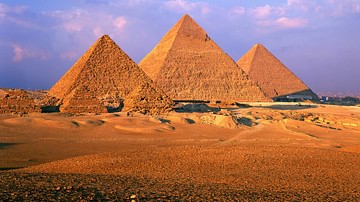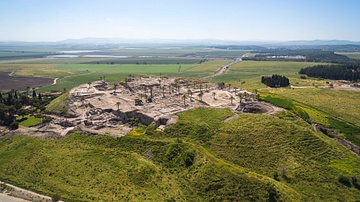The Battle of Megiddo (c. 1457 BCE) is one of the most famous military engagements in history in which Thutmose III (1458-1425 BCE) of Egypt defeated the coalition of subject regions led in rebellion by the kings of Kadesh and Megiddo. The battle itself was a decisive victory for Egypt and the seven- or eight-month siege which followed reduced the power of the subject kings, gave Thutmose III control of northern Canaan (from which he launched his campaigns into Mesopotamia), and elevated the Egyptian king's status to legend.
Thutmose III's Ascension & The Revolt
Thutmose III was the son of Thutmose II (1492-1479 BCE) by a lesser wife named Iset. Thutmose II's great royal wife was Hatshepsut (1479-1458 BCE), who was appointed regent to the young Thutmose III upon the death of his father. Hatshepsut, however, broke with the tradition which insisted on a male pharaoh and assumed the position herself.
Thutmose III grew up at court and received extensive military training as was expected for a prince in the period of the New Kingdom of Egypt (c. 1570 - c. 1069 BCE), the age of empire. When Hatshepsut died, Thutmose III came to power, and believing him to be weak and inexperienced, the king of the Syrian city of Kadesh incited a rebellion in the Egyptian province of Canaan which quickly gained support from other regions hoping to cast off Egyptian rule. This coalition assembled at the city of Megiddo.
The Battle of Megiddo & Inscription
In c. April of 1457 BCE, Thutmose III marched his army from Thebes to Megiddo in northern Canaan (northern Israel in the present day), prudently chose to approach the city by a narrow pass from the town of Aruna – instead of the wider and easier routes to the city – and surprised his enemies by entering the Qina Valley behind their defensive positions and driving them from the field. The entire campaign could have been ended that day, had the Egyptian army not halted their pursuit of survivors to collect treasures and trophies from the field; Thutmose III had to lay siege to the city to take it.
Thutmose III's commander and military scribe Tjaneni (also given as Thanuny, c. 1455 BCE) naturally accompanied his king on the campaign to put down the revolt and kept a journal detailing the engagement. Tjaneni's account so pleased Thutmose III that he had portions of it inscribed on the walls of the great Temple of Amun at Karnak and, to lesser extents, elsewhere. Tjaneni's report is among the most detailed of any campaign in Egypt's history including that of Ramesses II's famous account of The Battle of Kadesh in 1274 BCE.
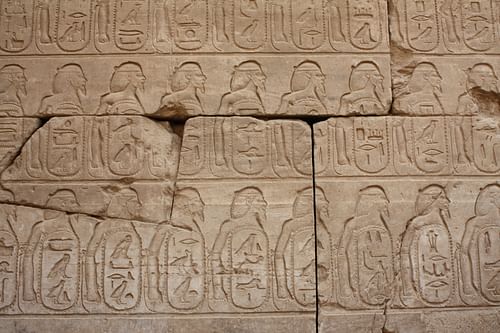
Tjaneni begins by explaining why the inscription is to be found engraved on the temple's walls. He then proceeds to detail the campaign and the reasons for it. The 'wretched enemy' mentioned periodically is the king of Kadesh who initiated the rebellion and organized the forces against Egypt but at some points is used to designate all who had joined the rebellion. Following the Battle of Megiddo, Thutmose III would subjugate and punish all who participated, conquering not only Kadesh but all of Syria and the lands of the Mitanni in Mesopotamia, among others.
Text of the Inscription
The following translation is by James B. Pritchard from his work Ancient Near Eastern Texts Relating to the Old Testament (1955), reprinted in The Ancient Near East, Volume I: An Anthology of Texts and Pictures also by Pritchard. Some passages have been omitted here for brevity or because they are incomplete or unclear. At points, a passage will be summarized in parentheses for clarity and to maintain narrative form. Brackets are used to clarify dates, expressions, or certain locations:
His majesty commanded that the victories which his father Amun had given to him should be established upon a monument in the temple which his majest had made for his father Amun, in order to set down each individual campaign together with the booty which his majesty carried off from it and the dues of every foreign country which his father Ra had given to him.
Year 22, 4th month of the second season, day 25 [possibly 16 April 1457 BCE]. His majesty passed the fortress of Sile [on the Egyptian frontier] on the first campaign of victory which his majesty made to extend the frontiers of Egypt, in valor, in victory, in power, and in justification. Now this was a long time in years…while every man was tributary before Egypt. But it happened in later times that the garrison which was there was in the town of Sharuhen while from Iursa to the outer ends of the earth [from southern Canaan to northern Syria] had become rebellious against his majesty.
(The army marched at a rate of 150 miles in 10 days to reach Gaza where they rested. They then moved on to the town of Yehem near Aruna where Thutmose III called a council of his commanders. There were three ways the army could travel to Megiddo: a narrow path where the troops would have to march single-file, a road to the south, and another to the north both of which were wider and would allow for an easier movement of the army. Thutmose III had decided on the narrow road from Aruna; his generals wanted to go by either of the two other easier routes).
His majesty ordered a conference with his victorious army, speaking as follows:
"That wretched enemy of Kadesh has come and has entered into Megiddo. He there at this very moment. He has gathered to him the princes of every foreign country which had been loyal to Egypt, as well as those as far as Naharin and Mitanni, them of Hurru, them of Kode, their horses, their armies, and their people, for he says – so it is reported - 'I shall wait here in Megiddo to fight against his majesty'. Will you tell me what is in your hearts?"
They said in the presence of his majesty: "What is it like to go on this road which becomes so narrow? It is reported that the foe is there, waiting on the outside, while they are becoming more numerous. Will not horse have to go after horse and the army and the people similarly? Will the vanguard of us be fighting while the rear guard is waiting here in Aruna unable to fight? Now, two other roads are here. One of the roads – behold, it is to the east of us, so that it comes out at Taanach. The other – behold, it is to the north side of Djefti, and we will come out to the north of Megiddo. Let our victorious lord proceed on the one of them which is satisfactory to his heart but do not make us go on that difficult road!"
Then messages were brought in about that wretched enemy and discussion was continued of that problem on which they had previously spoken. That which was said in the majesty of the Court – life, prosperity, health [a common blessing regarding pharaoh. Thutmose III spoke to the assembly:]
"I swear, as Ra loves me, as my father Amun favors me, as my nostrils are rejuvenated with life and satisfaction, my majesty shall proceed upon this Aruna road! Let him of you who wishes go upon these roads of which you speak and let him of you who wishes come in the following of my majesty! 'Behold', they will say, these enemies whom Ra abominates, 'has his majesty set out on another road because he has become afraid of us?' – So they will speak."
They said in the presence of his majesty:
"May thy father Amun, Lord of the Thrones of the Two Lands, Presiding over Karnak, act according to thy desire! Behold, we are following they majesty everywhere that thy majesty goes, for a servant will be after his lord."
Then his majesty laid a charge upon the entire army:
"Ye shall hold fast to the stride of your victorious lord on that road which becomes so narrow. Behold, his majesty has taken an oath, saying: 'I will not let my victorious army go forth ahead of my majesty in this place!'"
Now, his majesty had laid it in his heart that he himself should go forth at the head of his army. Every man was made aware of his order of march, horse following horse, while his majesty was at the head of his army.
(The army traveled by the narrow road from Aruna to Megiddo. The men marched in single-file, leading the horses. The chariots were dismantled and carried by the soldiers. Although reports had been received that the enemy would be waiting for them at the end of the narrow road, they found no one there. The coalition expected Thutmose III to take either of the easier paths and were actually waiting for him at the end of those roads.)
Then his majesty issued forth [from the narrow road] at the head of his army which was prepared in many ranks. He had not met a single enemy. Their southern wing was in Taanach while their northern wing was on the south side of the Qina valley. Then his majesty rallied [his troops] saying: "They are fallen! While that wretched enemy [watched for us in the wrong place, we have arrived to surprise them.] May ye give praise to Amun; may he extol the might of his majesty, because his arm is greater than that of any king. It has indeed protected the rear of his majesty's army in Aruna!"
Now while the rear of his majesty's victorious army was still at the town of Aruna, the vanguard had come out into Qina Valley and they filled the mouth of this valley.
Then they [his generals] said to his majesty – life, prosperity, health! – "Behold, his majesty has come forth with his victorious army and they have filled the valley. Let our victorious lord listen to us this time and let our lord guard for us the rear of his army and his people. When the rear of the army comes forth for us into the open, then we shall fight against these foreigners, then we shall not trouble our hearts about the rear of our army."
A halt was made by his majesty outside [of the valley] and he [sat] there guarding the rear of his victorious army. Now the leaders had just finished coming forth on this road when the shadow turned [meaning it was noon, when the sundial had to be repositioned. It took seven hours before the rearguard caught up to the vanguard of the army in the valley]. His majesty reached the south of Megiddo on the bank of the Qina brook when the seventh hour was in its course in the day.
Then a camp was pitched there for his majesty and a charge was laid upon the entire army, saying: "Prepare ye! Make your weapons ready, since one will engage in combat with that wretched enemy in the morning."
Resting in the enclosure of life, prosperity, and health [in the royal pavilion] the pharaoh provided for the officials, issuing rations to the retinue, posting the sentries of the army, saying to them: "Be steadfast, be steadfast! Be vigilant, be vigilant!" Awakening in life in the tent of life, prosperity, and health [he met with his messengers]. They came to tell his majesty: "The desert is well and the garrisons of the south and north also!"
His majesty set forth in a chariot of fine gold, adorned with his accoutrements of combat, like Horus, the Mighty of Arm, a lord of action like Montu, the Theban, while his father Amun made strong his arms. The southern wing of his majesty's army was at a hill south of the Qina brook and the northern wing was to the northwest of Megiddo, while his majesty was in their center. Amun being the protection of his person in the melee and the strength of Set pervading his members.
Thereupon his majesty prevailed over them at the head of his army. Then they [the enemy] saw his majesty prevailing over them, and they fled headlong to Megiddo with faces of fear. They abandoned their horses and their chariots of gold and silver so that someone might draw them up into this town by hoisting on their garments. Now, the people had shut this town against them but they let down garments to hoist them up into this town. Now, if only his majesty's army had not given up their hearts to capturing the possessions of the enemy, they would have captured Megiddo at this time, while the wretched enemy of Kadesh and the wretched enemy of this town were being dragged up hastily to get them into their town, for fear of his majesty entered their bodies and their arms were weak for his serpent-diadem had overpowered them.
Then their horses and their chariots of gold and silver were captured as easy as prey. Ranks of them were lying stretched out on their backs like fish in the bight of a net while his majesty's victorious army counted up their possessions. Now there was captured that wretched enemy's tent which was worked with silver.
Then the entire army rejoiced and gave praise to Amun because of the victory which he had given to his son on this day. They lauded his majesty and extolled his victories. Then they presented the plunder which they had taken: hands [hands cut off as spoils of war], living prisoners, horses, and chariots of fold and silver and of painted work.
Then his majesty commanded his army with these words:
"Capture ye effectively, my victorious army! Behold, all foreign countries have been put in this town by the command of Ra on this day, inasmuch as every prince of every northern country is shut up within it for the capturing of Megiddo is the capturing of a thousand towns! Capture ye firmly, Firmly!"
Orders were issued to the commanders of the troops to provide for their divisions and to inform each man of his place. They measured this city, which was corralled with a moat and enclosed with fresh timbers of all their pleasant trees, while his majesty himself was in a fortress east of this town, being watchful. He ordered the town enclosed with a girdled wall. Its name was called "Men-kheper-Ra-is-the Corraller-of-the-Asiatics." People were appointed as sentries at the enclosure of his majesty and they were told: "Be steadfast, be steadfast! Be vigilant, be vigilant!" Not one of them was permitted to go outside from behind this wall except to come out at a knock on the door of their fortress [by an Egyptian].
Now everything which his majesty did to this town and to that wretched enemy and his wretched army is set down by the individual day by the individual expedition and by the individual troop commanders. They are set down on a roll of leather in the Temple of Amun today.
Now the princes of this foreign country came on their bellies to kiss the ground to the glory of his majesty and to beg breath for their nostrils because his arm was so great, because the prowess of Amun was so great over every foreign country, all the princes whom the prowess of his majesty carried off, bearing their tribute of silver, gold, lapis lazuli, and turquoise, and carrying grain, wine, and large and small cattle for the army of his majesty, with one gang of them bearing tribute southward. Then his majesty appointed princes anew for every town.
List of the booty which his majesty's army carried off from the town of Megiddo:
340 living prisoners and 83 hands, 2,041 horses, 191 foals, 6 stallions; 1 chariot worked with gold with a body of gold belonging to that enemy, 1 fine chariot worked with gold belonging to the prince of Megiddo, and 892 chariots of his wretched army – total: 924. 1 fine bronze coat of mail belonging to that enemy, 1 fine bronze coat of mail belonging to the prince of Megiddo, and 200 leather coats of mail belonging to his wretched army; 502 bows, and 7 poles of meru-wood worked with silver of the tent of that enemy.
Now the army of his majesty carried off cattle of 387, 1,929 cows, 2,000 goats, and 20,500 sheep. List of what was carried off afterward by the king from the household goods of that enemy who was in Uanoam, Nuges, and Herenkeru [of northern Syria] together with the property of those towns which had made themselves subject to him: 38 [officers] belonging to the enemy, 84 children of that enemy and of the princes who were with him, 5 [officers] belonging to them and 1,796 male and female slaves as well as their children and 103 pardoned persons who had come out from that enemy because of hunger – total: 2,503 – apart from bowls of costly stone and gold, various vessels (100), a large jar in Syrian work, jars, bowls, plates, various drinking vessels, large kettles, 17 knives – making 1,784 deben [the Egyptian monetary unit], gold in discs found in the process of being worked, as well as abundant silver in discs – 966 deben and 1 kidet, a silver statue with a head of gold, 3 walking sticks with human heads, 6 carrying chairs of that enemy of ivory, ebony, and carob-wood, 1 bed belonging to that enemy of carob-wood worked with gold and with every kind of costly stone, completely worked in gold, a statue of that enemy which was there of ebony worked with gold, its head of lapis lazuli, bronze vessels and much clothing of that enemy.
Now the fields were made into arable plots and assigned to inspectors of the palace in order to reap their harvest. List of the harvest which his majesty carried off from the Megiddo acres: 207,300 plus sacks of what apart from what was cut as forage by his majesty's army.
